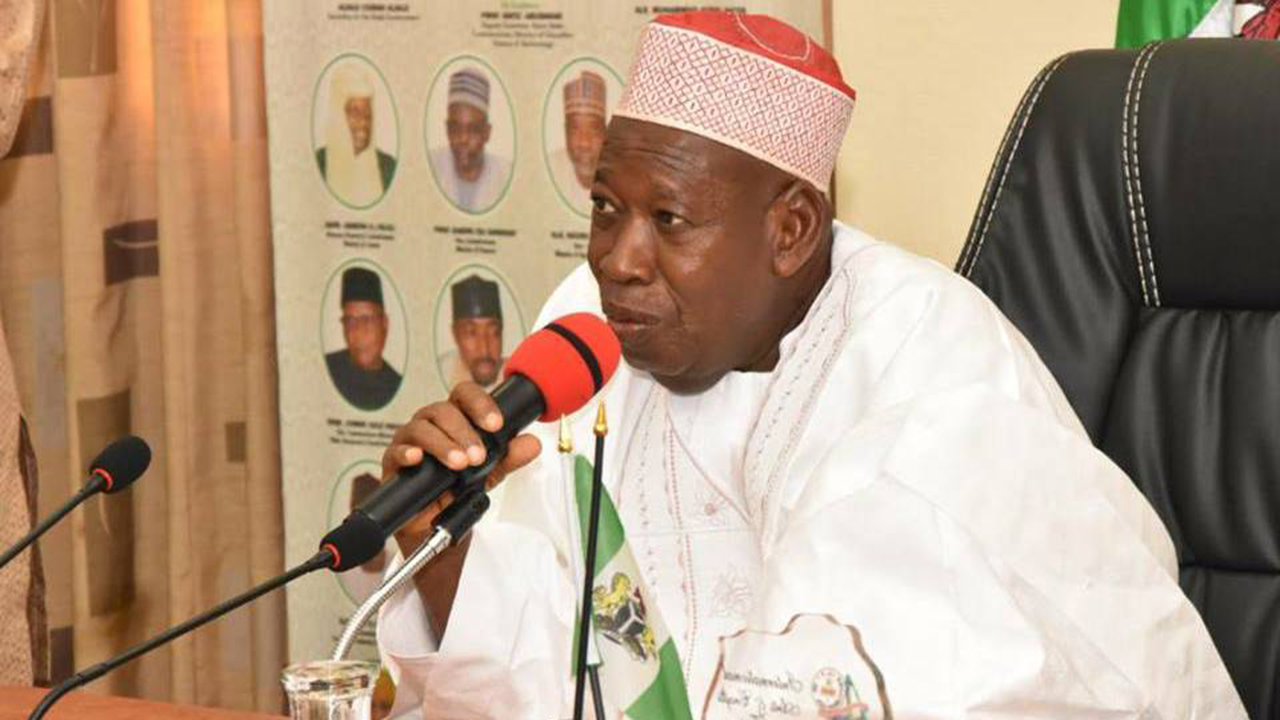
With the installation of the new emirs, Ganduje not only reduced the powers of Emir of Kano, Muhammadu Sanusi II, but also mandated a two-year rotational leadership of the Kano State Emirates Council among the five emirs.
The new monarchs are, Emir of Karaye, Alhaji (Dr.) Ibrahim Abubakar II; Emir of Rano, Alhaji Tafida Abubakar Ila; Emir of Bichi, Alhaji Aminu Ado Bayero and Emir of Gaya, Alhaji Ibrahim Abdulkadir.
Inaugurating the new emirate councils at the Sani Abacha Stadium, Governor Ganduje charged the traditional rulers to assume their new responsibilities with trust and dedication to serve.
He directed all district heads under each of the new four emirates to henceforth withdraw their previous traditional homage and redirect same to appropriate emirates.
The governor tasked them to ensure the implementation of government policy on compulsory primary education, healthcare and agriculture.
A Kano High Court sitting at Ungogo on Friday granted an order, which restrained Ganduje from implementing any action to legitimise the new emirates. The presiding judge, Justice Nasiru Saminu, in a suit filed by one Rabiu Sule Gwarzo, gave an interim injunction directing all parties in the suit to maintain status quo pending the hearing and determination of the motion on notice.
Reacting to the high court order, Ganduje insisted he was not aware of any directive restraining the government from appointing the first class emirs, adding that appointment letters from the office of the Secretary to the State Government (SSG), Alhaji Usman Alhaji, had been issued since Thursday May 9, 2019, and dispatched to the new monarchs the following day, prior the pronouncement of the said court order.
According to him, “While the court order was first pronounced at about 5pm on Friday 10th May, 2019, the emirs had all received and returned their acceptance letter, from 10am to 12noon. For the benefit of doubt, the new Emir of Karaye, Alhaji (Dr.) Ibrahim Abubakar II signed his acceptance by 12 noon and Emir of Rano Alhaji Tafida Abubakar Ila, signed his acceptance by 10:15 am.
“Similarly, the Emir of Bichi, Alhaji Aminu Ado Bayero, signed his acceptance by 10am and the Emir of Gaya, Alhaji Ibrahim Abdulkadir, signed his letter by 10:30am. So today’s (yesterday’s) event was only held as a symbolic presentation of notification of appointment letters,” Ganduje noted.
Meanwhile, a Professor of Law at the Bayero University, Kano, Mamman Lawan Yusufari has stressed that disregarding court order, irrespective of its merit could amount to contempt of court, an offence that may attract jail sentence.
Yusufari, who maintained that whether or not the governor received the said court order was another matter entirely, added that under no circumstances should all parties disregard interim order of court.
“I learnt that there was an interim order restraining the government and other parties from carrying out the swearing in of the new emirs. Now, whether or not the court should issue such order is another matter entirely, and what also comes to mind is whether or not the order was served on the concerned parties.
“Ordinarily the order of a court is meant to be respected and obeyed even if the order was wrongly obtained. It will definitely amount to contempt of court for anybody or parties to disregard an order, which was not set aside by a court of higher jurisdiction,” Professor Yusufari explained.
Reacting to the appointment of the new emirs, state secretary of the Peoples Democratic Party (PDP), Shehu Sagagi accused the state government of misplaced priority, wondering how the establishment of the emirates would reduce the number of 3.5 million unemployed youths in Kano.
Sagagi, who equally queried the lawmaker’s speedy passage of the appointment and deposition law, added that the act would not stand the test of time.
The PDP secretary, who challenged Governor Ganduje to settle his personal grievances with Emir Muhammadu Sanusi, rather than destroying the 800 years traditional Kano heritage, stressed that the appointments constitute another avenue for wastage of taxpayers’ money.
In a counter reaction, the state secretary of the ruling All Progressives Congress (APC), Alhaji Ibrahim Zakari Sarina accused the PDP of mischievously condemning all policies of the Ganduje-led administration, insisting that the party is still suffering from post-election loss.
Ibrahim insisted the new emirates would further open wide opportunities for economic growth and drive development to the grassroots, which have suffered years of neglect.
MEANWHILE, Emeritus Professor of History, Anthony Asiwaju has expressed concern that the Nigerian traditional institution is in danger and fears that chieftaincy institution may soon be wiped off or reduced to historical facts.
Commenting on the Kano situation, Asiwaju said: “For sometime now, we are worried about the debasement of the traditional institution by the government. Some of us with interest in chieftaincy institution met in Ibadan on May 1 this year and reviewed the situation and future of kingship institution in Nigeria and our discoveries show serious dangers.
“We discovered that it is unfortunate that government has unfettered control over this institution and this has subjected it to the whims and caprices of the politicians.
“This ought not to be so. We reviewed what happened in Ibadan and how Governor Abiola Ajimobi tried to reduce the influence of Olubadan and that is the same thing we are witnessing in Kano State, which may continue. And this is not good for that institution.”
The octogenarian said the country must come out with the policies that will make traditional rulers responsible to their people and not to politicians who are oblivious of the culture and tradition of the people.
The foremost historian said it was unfortunate that most traditional rulers do not know the history of their kingdoms, which he blamed for the crisis in royal circles.
[ad unit=2]



